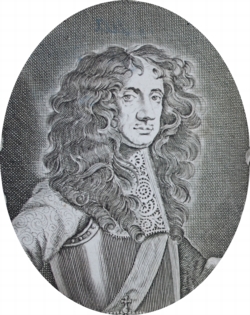
On the side (how many sides can one have?), I've been reading/collecting research on a very interesting pair of figures, whom I am beginning to think are more closely related than we have heretofore thought:
Sir Robert Filmer, the seventeenth-century traditionalist political philosopher, and T.S. Eliot, the twentieth-century poet and conservative social thinker.
The interesting thing about Filmer is not (at least at first blush) his direct influence, which has been negligible, but the extent to which he has been misunderstood by the Lockeans, whose contractarian liberalism certainly carried the day against Filmer's patriarchalism. Famously, Locke responded to the argument of Filmer's
Patriarcha in the first of his
Two Treatises of Government, and Lockean contractarians have frequently defined themselves against a kind of Filmerian patriarchalism up to the present day: indeed, I heard exactly this opposition declared at a seminar panel earlier this year. Filmer represents for present-day Lockeans a kind of proto-paleo-con, and this is not an unreasonable construction, as a few influential paleo-cons have claimed Filmer as an important influence. I think, for instance, of M.E. Bradford, who took the side of Filmer, over against his erstwhile nemesis, Harry Jaffa, who took the side of Locke (see Bradford's "A neglected classic : Filmer's
Patriarcha," in
Saints, Sovereigns, and Scholars [1993]).

Interestingly, it now seems that the influence of Sir Robert on the paleo-conservative tradition has been mediated through T.S. Eliot, who appears to have written a couple of unsigned reviews of Filmer in 1828, a fact unearthed a few years back by David Bradshaw, a British scholar of modernism (see
"Lonely Royalists: T.S. Eliot and Sir Robert Filmer," Review of English Studies 46.183 [1995]). As Bradshaw's argument suggests, Eliot's political thinking seems to have been influenced by Filmer's thought at a critical junction in his career, and in ways we haven't adequately realized yet. This could be an interesting trail to follow, because T.S. Eliot exerted a great influence on the American conservative Russell Kirk, and thus on what became the paleo-conservative movement as a whole (esp. important here are his
Idea of a Christian Society [1939] and Notes Toward the Definition of Culture [1948]). So the historical tension between (Lockean) neo-conservatism and (Filmerian) paleo-conservatism does seem to go back at lest to the earlier Twentieth Century, even if we can't see much of it in the Nineteenth.

I said originally, though, that the Lockeans misunderstood Filmer, and here is what I meant: as a number of scholars have shown over the past few decades, Filmer was responding in the
Patriarcha, not to Hobbes or some other proto-Lockean political thinker (though he did write against Hobbes, Milton, and others elsewhere), but to the late-scholastic political philosophy of
Robert Bellarmine and
Francisco Suarez, who had been developing Thomistic theories of natural rights, regicide, etc., over the half-century prior to Filmer's work. So while Locke's followers (and perhaps Locke himself) have tended to see the political-theoretical choice as between Filmerian patriarchalism and their own brand of secularized contract theory, that binary now seems too simple. Certainly, it was not so simple at the time Filmer and Locke were writing. So now, since we could very much use a fresh (yet theoretically dense and historically grounded) view of human nature and how to think about it in the modern world, it seems we might do well to look at Suarez and Bellarmine, and consider the extent to which they provide a
tertium quid, a third way for those of us not entirely satisfied with either paleo- and neo-conservatism.
 So right now I am working through parts of William Paley's Evidences of Christianity (1794), mainly so that I can understand the marginalia John Henry Newman left in his copy. He marked the book up a good deal in preparation for his first Essay on Miracles (1826), and relied upon Paley as an initial guide in responding to Hume's critique of miracles in the Enquiry Concerning Human Understanding (1748). However, by the time he wrote his second Essay (1843) more than fifteen years later, Newman had come to think of Paley's evidence-based approach (similar to some apologetics still practiced today) as tending toward rationalism, misguided in its insistence on the priority of rational proof over the grounds provided by rational faith.
So right now I am working through parts of William Paley's Evidences of Christianity (1794), mainly so that I can understand the marginalia John Henry Newman left in his copy. He marked the book up a good deal in preparation for his first Essay on Miracles (1826), and relied upon Paley as an initial guide in responding to Hume's critique of miracles in the Enquiry Concerning Human Understanding (1748). However, by the time he wrote his second Essay (1843) more than fifteen years later, Newman had come to think of Paley's evidence-based approach (similar to some apologetics still practiced today) as tending toward rationalism, misguided in its insistence on the priority of rational proof over the grounds provided by rational faith.




